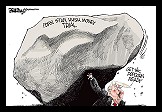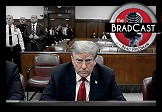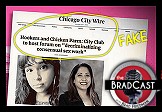 Earlier this week I posted my invitation to address the U.S. Election Assistance Commission (EAC), on behalf of The BRAD BLOG, at a roundtable of "Voter Advocates" to discuss the proposed 2007 federal Voluntary Voting Systems Guidelines (VVSG).
Earlier this week I posted my invitation to address the U.S. Election Assistance Commission (EAC), on behalf of The BRAD BLOG, at a roundtable of "Voter Advocates" to discuss the proposed 2007 federal Voluntary Voting Systems Guidelines (VVSG).
Given the primary in PA this week and other considerations, as I noted then, it seemed wiser for me to stay back here in LA rather than travel to and from DC this week. So I asked computer security expert and e-voting specialist Dr. Rebecca Mercuri to sit in for us. She did so yesterday, and will be joining Peter B. Collins and me tonight on his radio show, during my weekly Friday guest appearance (5pm PT, 8pm ET, listen online here) to report on how things went.
I was, at least, able to submit my own written statement to the EAC, with my fairly direct thoughts on the VVSG and the nightmare such federal certification standards have wrought. The statement is now posted [PDF] at the EAC website, along with some of the statements from some of the other participants, and it's also posted in full below.
I'll try to update this item with the audio from the PBC show later tonight, and Dr. Mercuri will likely post her own report in full here at The BRAD BLOG in the coming days.
Update: Audio from the PBC Show, with myself and Dr. Mercuri discussing the EAC roundtable, now available for download [MP3], or online listening here (commercials removed, appx 42 mins)...
My written testimony/statement to the EAC follows in full below. Please enjoy, and feel free to let me know what you think in comments...
Publisher/Editor, The BRAD BLOG (www.BradBlog.com)
Co-Founder, VelvetRevolution.us
FOR
THE U.S. ELECTION ASSISTANCE COMMISSION’S
“VOTING ADVOCATE” ROUNDTABLE DISCUSSION
ON PROPOSED 2007 VOLUNTARY VOTING SYSTEM GUIDELINES
THURSDAY, APRIL 24, 2008
I wish to thank the EAC for extending an invitation to The BRAD BLOG to participate in today’s roundtable discussion. The effort to reach out to citizen election integrity advocates is long overdue for this commission. I hope that this meeting will be just the first step, as long as this body remains commissioned, towards an increased effort to begin welcoming the most important stakeholders in our elections – the citizens themselves – into a process that has, since the EAC was convened via the Help America Vote Act of 2002, remained far too long the near-exclusive domain of those who profit from it, and those who have been tasked with administrating our elections as servants on behalf of those citizens.
While being asked to offer input, from a “Voting Advocate” standpoint, on the proposed 2002 federal Voluntary Voting System Guidelines (VVSG), I was immediately struck by the 598 pages of technical specifications for new electronic voting systems. While nearly complex enough to ensure safe passage to the moon and back, the proposed standards, unfortunately, fail to offer the simplicity and transparency necessary for the simple task of adding one plus one plus one, in such a way that all American citizens can enjoy confidence that their voting system works, and that every vote has been counted --- and counted accurately – as per each voter’s intent.
I should note that counting votes accurately, in and of itself, is not enough if only a select group of privileged corporate insiders, elected or selected government officials, or computer scientists, engineers, and security “experts” are granted permission to review data unavailable to the general public.
Accurate vote counts are ultimately meaningless if we, the people, are unable to know that they are, indeed, accurate.
Confidence in the accuracy and security of voting systems, as attested to by only selected, privileged individuals, cannot --- and must not --- ever be tolerated as a substitute for the rights that we, the people have to ensure our government is truly one selected of the people, by the people, and for the people.
To that end, while I applaud the assiduous and exacting attempts of the scientists, engineers, and security experts of the Technical Guidelines Development Committee (TGDC) who have worked with the National Institute of Standards and Technology (NIST) to develop the proposed 2007 VVSG, I feel it necessary to trumpet the clear and unambiguous message of all of the American citizens who are not computer scientists, not computer technicians, not computer security experts, not election administrators, and not “election industry” corporate insiders.
While the currently proposed VVSG makes a valiant effort at dealing with crucial, yet unaddressed or poorly-addressed, issues in previous sets of voluntary federal voting system standards, ultimately, the latest update serves to do little more than encourage and enable the continued use of voting devices and machinery which overcomplicate our voting process. The blizzard of technical specifications serves only to obscure the fact that, even if such specifications are followed to the satisfaction of federal testers, it will likely continue to remain next to impossible for citizen voters to determine for themselves whether or not reported election results are truly accurate.
Just as previous voluntary federal standards have enabled Election Officials around the country to point to their selected voting systems and proudly (if often cynically) declare them to be “secure and accurate,” simply because they reportedly met such standards during secret testing, I am concerned that these “new and improved” standards will similarly be used to offer a chimera of “security and accuracy” to voting systems which, nonetheless, require blind faith in the system itself. Therefore, the message I hope deliver to you today, on behalf of election integrity advocates – otherwise known as citizen voters --- on the ground, from across the entire country, is that if we cannot see it, we cannot trust it.
As I am unable to attend the roundtable in person, I’ve asked Dr. Rebecca Mercuri to represent the interests of The BRAD BLOG today, and am confident she will be able to expound on the details – specific, technical, and otherwise – of how that idea translates into practical standards for any voting system worthy of our representative democracy.
In this statement, I hope to deliver the crystal-clear, unambiguous, no-uncertain-terms demand that America deserves nothing less than a transparent, secure voting system, which every citizen can oversee, every step of the way – whether or not they happen to be computer experts, election officials, or voting machine vendors or employees --- so that we, the people, may have a fighting chance for an election system, and election results, in which we, the people, can truly entrust our confidence.
I recognize that the administration of such systems, particularly at the federal level, with so many jurisdictions and legal requirements in fifty different states and thousands of counties across the country, is no simple task. I also recognize the responsibilities of the citizenry to participate in, and oversee, the often-complicated processes and exacting standards which are necessary to ensure the private, secure, and accurately counted ballot of every citizen who wishes to exercise his or her franchise in an American election.
Similarly, I appreciate that various, yet limited, concessions and compromises in full voting system transparency may have to be sacrificed in order to offer accommodations for blind and disabled voters who may choose to vote “privately and independently,” as HAVA requires, without the aid of a human assistant.
But while the process to accomplish all of the above may be often-complicated, it needn’t be overly-complicated.
Neither must it be allowed to forever become the private property of private corporations that have alarmingly subverted the public process of American democracy by converting it into their own exclusive, privileged, proprietary domain.
Neither must our public servants, granted the privilege of administrating our public elections on behalf of the people, continue to enable and serve those private, proprietary interests over the public interests and rights that we, the people, have.
In that light, I call for an immediate end to the dangerous path this commission continues to enable in its support of the fully faith-based, privatized, proprietary, non-transparent voting systems which have disabled and deprived us --- we, the people – from being able to ensure that elections results indeed represent the consent of the governed.
The Election Assistance Commission has overseen and enabled a federal process which, up until now, has granted a federal blessing to voting systems such as Direct Recording Electronic (DRE/touch-screen) devices for which it is literally impossible for anyone to prove that any single vote, ever cast on such a system during any actual election, for any candidate or initiative on the ballot, has ever actually been cast and recorded accurately as per the intent of any voter.
I extend the invitation --- to any vendor or official, including any member or employee of this commission --- to prove otherwise, and to demonstrate that any such vote was ever recorded accurately during any American election. Even as I well understand that that proof, the minimum citizens could ever ask for in regard to their voting system, will never come.
That such unverifiable systems are in use today --- and will be used again by millions of voters this November --- is an unmitigated disgrace, and underscores a massive collective failure of common-sense oversight and a nearly-unforgivable delinquency by those charged with that task at the federal level.
Such a failure is also the result of previous collective efforts by federal commissions and enabled bodies which have preceded this one, and of anyone who would allow or encourage the use of such systems in our democracy, be it this week, this November, or in any American election to come.
The very basis for our Constitutional system is one of checks and balances. Yet without the ability to apply such checks and balances, such as with the DRE systems used to record millions of votes in this year’s election cycle alone, the citizens have been completely blinded and robbed of their right and ability to assure the consent of the governed.
We have been forced, for too many years now, merely to accept the pronouncements of election officials – who themselves have been forced to accept the pronouncements of flawed, error-prone, under-tested, easily-manipulated computer systems and processes which purport to count ballots, often invisibly, and almost always secretively – without having the ability to perform our constitutional right and duty of oversight for every step of the process.
Without such a paramount ability, it has become nearly impossible to carry out anything that has a chance of being seen as a truly successful election.
Following the 2004 Presidential Election debacle, Green Party Presidential candidate David Cobb declared, at a citizen’s hearing in Ohio: “Either every vote is sacred, or our democracy is a sham.”
Unfortunately, with electronic voting and tabulation systems such as those in use across our country today --- and assured for continued use tomorrow, and for decades to come, should the mind-numbingly technical, absurdly over-complicated, and dangerously flawed VVSG be approved and used as a basis for federal voting system certification – American democracy is certain to continue its ill-conceived sprint straight over a treacherous and damnable cliff.
We, the people, cannot possibly succeed in our efforts, and duty, to ensure the sacredness of every vote, if the secret-ness of the very processes of counting those votes, and counting them accurately, has taken precedence over the right that we, the people (not we, the computer scientists, or we, the corporate insiders), have to ensure the integrity of that process and the accuracy of each and every ballot tabulated.
Without that ability, democracy surely, as Mr. Cobb stated, becomes little more than “a sham.”
To that end, it’s my hope that the process embarked on today will begin to lead us to back away from the precipice we have been sprinting toward, with alarming speed, for far too long. I hope the simple benchmark of “if we can’t see it, we can’t trust it,” will become a siren song for all of those entrusted with the privilege of developing, creating, implementing, adopting, testing, approving, and overseeing “voting technology” and systems worthy of our representative democracy.
While both Dr. Mercuri and I recognize the necessity of ensuring that we, the people, can observe every step of the voting process (with the exception of the citizen’s privileged moment while filling in, and casting, a ballot), we also realize that such transparency, alone, does not necessarily translate into an automatic grant of “trust” in the system. But in the use of systems which afford such transparency, at least we, the people, will then have a fighting chance of gaining trust in their use.
Coupled with transparent, well-documented, publicly available and fully-observable security processes and chains-of-custody for every element of the voting system, we, the people, may once again be able to work to ensure that every vote is sacred and American democracy will no longer be seen around the world – as it too-frequently now is --- as little more than a sham.
It is with those principles in mind that we offer input towards the specific questions that you’ve given to us, in regard to the proposed 2007 VVSG. And it is in that spirit that we hope you, the commission, and the other esteemed “Voting Advocates” might join us in careful consideration of the questions posed, concerning the new, proposed technical specifications for voting systems, as presented by the document in question.
As mentioned, we find the document ultimately lacking in many respects, upon which Dr. Mercuri will elaborate in additional technical detail, both in her written testimony and via her personal participation at the roundtable itself.
But I’d like to offer just two concrete examples of flaws immediately noticeable, from a citizen voter’s point of view, in the proposed guidelines.
The first example is found in the “Purpose” of the standards, as defined in section 3.1.1 describing the “challenge” hoping to be met by the 2007 VVSG. That challenge is described as one “to provide a voting system that voters can use comfortably, efficiently, and with justified confidence that they have cast their votes correctly.”
While such objectives are certainly worthy, the statement itself, as with much of the rest of the document, fails to even consider the simple question of whether voters can have “justified confidence” that their votes have been counted accurately by federally approved systems.
Comfort, efficiency, and confidence in having cast a vote --- without the appropriate attention to whether or not “justified confidence” can be obtained by every voter that such comfortable, efficiently cast ballots have accurately been tabulated – leaves our electoral system in the same alarming shambles that it has become. How such an egregious oversight could find its way into such a document is simply beyond me.
Another example of where the VVSG falls far short of what citizens require from any federal voting system standards is the lack of definition for the concept of “transparency” itself.
Though the word is used a precious few times throughout the 598 pages of proposed technical standards, and even though the first-named subcommittee established by the TGDC in 2004 was the “Security and Transparency” subcommittee, the concept or definition of a voting system, fully transparent to the voter for whom its designed, is nowhere to be found in the voluminous document.
While Dr. Mercuri will offer more such insight and concerns to you today, I must stress, however, that our involvement and participation in this process may not be offered or used by the EAC or any of the sub-committees or representatives thereof – in any way, shape or form – as representing approval of this process, or endorsement of its ultimate outcome, including any version of the VVSG which may become approved for federal use by this commission.
Both Dr. Mercuri and I have extensive, and noteworthy, technical backgrounds, with considerable joint expertise in computer programming, design, security, and other related issues. But today, we come to this panel in hopes of representing the voice of the citizenry for whom this body has been commissioned to serve.
Therefore, the concerns expressed in this statement, in initial response to your submitted technical questions, are on behalf of…
…the more than 12,000 citizen voters whose legally and accurately cast votes were discarded because it was inconvenient to count them after the federally qualified optical-scan systems, marketed by the ES&S corporation, were programmed in such a way that they could not tabulate ballots correctly during the 2008 Democratic Primary in Los Angeles County;
…the 18,000 citizen voters who were most-assuredly disenfranchised when the federally qualified ES&S iVotronic touch-screen systems in Sarasota County’s 13th Congressional District election failed to record their votes properly in 2006;
…the thousands of disenfranchised citizen voters who saw their votes flip before their very eyes on federally qualified touch-screen voting systems made by Diebold and Sequoia and ES&S and other vendors all across the country in 2004, only to be told when they attempted to alert officials and media that they were crazy, sore losers, conspiracy theorists, or that it didn’t really matter anyway;
…the 4,500 citizen voters who had no idea that their votes would be completely lost by the federally qualified UniLect Patriot voting system in Carteret County, NC, that same year.
…and as importantly, if not more so, those citizens who have sacrificed their lives, over decades of American history, on these shores, and overseas, to ensure that every American citizen could exercise his or her right to cast a legal vote, privately and independently, that every vote would be sacred, counted and counted accurately, and that American democracy might be seen the world over as anything but a sham.
In closing, I’d like to draw your attention to the mission statement constructed by a small, but diverse, group of citizen election integrity advocates, including members of the media, an election official, and even a vendor, who gathered recently in Northern California. Our hope in crafting the statement (I was honored to be one of the attendees) was to find common ground, and prepare for the continued, long, and eternally vigilant fight we all face to ensure that the United States meets its promise as “the world’s greatest democracy.”
In eight simple words, certainly far fewer than 598 pages, or even the 6 pages of this document, we defined the heart of the mission I challenge all Americans – whether public servant, advocate, vendor or elected official – to join. The mission, officially adopted as “The Creekside Declaration” on March 22, 2008, as reported by both Robert Koehler in his syndicated Tribune Media Services column, and by myself at The BRAD BLOG, is simply: “To encourage citizen ownership of transparent, participatory democracy.”
That ideal must underscore every effort we make today, tomorrow, and in the months and years ahead, as we all work to ensure continued citizen ownership of a transparent, participatory democracy.
That must become your mission at the EAC. Meeting that ideal must underscore your adoption of any new federal voting system guidelines. “If we can’t see it, we can’t trust it.” If it does not aid in the mission to “encourage citizen ownership of transparent, participatory democracy,” it must not be adopted or implemented.
America deserves standards no lower, and we hope you will pledge to join me and millions of citizens towards those ends.
I thank you again for allowing The BRAD BLOG into this process, along with the millions of concerned citizens who follow, support and share in our work on a regular basis, and to whom we feel duty bound to give voice to today. I hope that more opportunities will arise to bring more of the stakeholders together (and we consider the voters, on whose behalf I hope to write today, to be the primary, yet most-ignored, stakeholders of all in this process) in hopes of finding a more productive, more constructive, and less divisive path on which we can all proceed towards what I hope is the shared goal of a clean, fair, open, accurate, secure, and transparent, participatory democracy in which we can all, one day – hopefully very soon --- have full confidence.
Brad Friedman
Los Angeles, CA
April 21, 2008


 'Election Fraud, Pure and Simple': 'BradCast' 4/23/24
'Election Fraud, Pure and Simple': 'BradCast' 4/23/24 'Green News Report' 4/23/24
'Green News Report' 4/23/24
 'First Domino Falls' in UAW Effort to Unionize the South: 'BradCast' 4/22/24
'First Domino Falls' in UAW Effort to Unionize the South: 'BradCast' 4/22/24 Sunday 'Popcorn Ready' Toons
Sunday 'Popcorn Ready' Toons Bad Climate News for Home, Car Owners; Good Labor News for Workers in the South: 'BradCast' 4/18/24
Bad Climate News for Home, Car Owners; Good Labor News for Workers in the South: 'BradCast' 4/18/24 'Green News Report' 4/18/24
'Green News Report' 4/18/24 SCOTUS Suddenly Worried About Overcriminalization ... for J6 Insurrectionists: 'BradCast' 4/17/24
SCOTUS Suddenly Worried About Overcriminalization ... for J6 Insurrectionists: 'BradCast' 4/17/24 'Trump Media' Plummeting, MAGA Buyers Losing Life Savings: 'BradCast' 4/16/24
'Trump Media' Plummeting, MAGA Buyers Losing Life Savings: 'BradCast' 4/16/24 'Green News Report' 4/16/24
'Green News Report' 4/16/24 Trump's First Criminal Trial, for Cheating in 2016, Begins in NY: 'BradCast' 4/15/24
Trump's First Criminal Trial, for Cheating in 2016, Begins in NY: 'BradCast' 4/15/24 Sunday 'Party Like It's 1864' Toons
Sunday 'Party Like It's 1864' Toons Biden Closes 'Gun Show Loophole'; Repubs Turn Desperate: 'BradCast' 4/11/24
Biden Closes 'Gun Show Loophole'; Repubs Turn Desperate: 'BradCast' 4/11/24 'Green News Report' 4/11/24
'Green News Report' 4/11/24 'Pink Slime': Fake 'Local News' Sites Proliferating in Advance of Election: 'BradCast' 4/10/24
'Pink Slime': Fake 'Local News' Sites Proliferating in Advance of Election: 'BradCast' 4/10/24 Dirty Tricks and the Dirtiest Candidate Of All Time: 'BradCast' 4/9/24
Dirty Tricks and the Dirtiest Candidate Of All Time: 'BradCast' 4/9/24 'Titanic Law' Reform Just Tip of Iceberg in Quest for Key Bridge Accountability: 'BradCast' 4/8/24
'Titanic Law' Reform Just Tip of Iceberg in Quest for Key Bridge Accountability: 'BradCast' 4/8/24 Trump's Very Bad Day in Court(s), Other Good (& Less Good) News: 'BradCast' 4/424
Trump's Very Bad Day in Court(s), Other Good (& Less Good) News: 'BradCast' 4/424 WI Supremes May Restore Drop-Box Voting
WI Supremes May Restore Drop-Box Voting WI Voters Approve Election Crippling Ballot Measures: 'BradCast' 4/3/24
WI Voters Approve Election Crippling Ballot Measures: 'BradCast' 4/3/24 Politico's Josh Gerstein Owes a Retraction
Politico's Josh Gerstein Owes a Retraction More GOP Election Fraud; Overdue Justice for Crystal Mason: 'BradCast' 4/2/24
More GOP Election Fraud; Overdue Justice for Crystal Mason: 'BradCast' 4/2/24
 VA GOP VOTER REG FRAUDSTER OFF HOOK
VA GOP VOTER REG FRAUDSTER OFF HOOK Criminal GOP Voter Registration Fraud Probe Expanding in VA
Criminal GOP Voter Registration Fraud Probe Expanding in VA DOJ PROBE SOUGHT AFTER VA ARREST
DOJ PROBE SOUGHT AFTER VA ARREST Arrest in VA: GOP Voter Reg Scandal Widens
Arrest in VA: GOP Voter Reg Scandal Widens ALL TOGETHER: ROVE, SPROUL, KOCHS, RNC
ALL TOGETHER: ROVE, SPROUL, KOCHS, RNC LATimes: RNC's 'Fired' Sproul Working for Repubs in 'as Many as 30 States'
LATimes: RNC's 'Fired' Sproul Working for Repubs in 'as Many as 30 States' 'Fired' Sproul Group 'Cloned', Still Working for Republicans in At Least 10 States
'Fired' Sproul Group 'Cloned', Still Working for Republicans in At Least 10 States FINALLY: FOX ON GOP REG FRAUD SCANDAL
FINALLY: FOX ON GOP REG FRAUD SCANDAL COLORADO FOLLOWS FLORIDA WITH GOP CRIMINAL INVESTIGATION
COLORADO FOLLOWS FLORIDA WITH GOP CRIMINAL INVESTIGATION CRIMINAL PROBE LAUNCHED INTO GOP VOTER REGISTRATION FRAUD SCANDAL IN FL
CRIMINAL PROBE LAUNCHED INTO GOP VOTER REGISTRATION FRAUD SCANDAL IN FL Brad Breaks PA Photo ID & GOP Registration Fraud Scandal News on Hartmann TV
Brad Breaks PA Photo ID & GOP Registration Fraud Scandal News on Hartmann TV  CAUGHT ON TAPE: COORDINATED NATIONWIDE GOP VOTER REG SCAM
CAUGHT ON TAPE: COORDINATED NATIONWIDE GOP VOTER REG SCAM CRIMINAL ELECTION FRAUD COMPLAINT FILED AGAINST GOP 'FRAUD' FIRM
CRIMINAL ELECTION FRAUD COMPLAINT FILED AGAINST GOP 'FRAUD' FIRM RICK SCOTT GETS ROLLED IN GOP REGISTRATION FRAUD SCANDAL
RICK SCOTT GETS ROLLED IN GOP REGISTRATION FRAUD SCANDAL VIDEO: Brad Breaks GOP Reg Fraud Scandal on Hartmann TV
VIDEO: Brad Breaks GOP Reg Fraud Scandal on Hartmann TV RNC FIRES NATIONAL VOTER REGISTRATION FIRM FOR FRAUD
RNC FIRES NATIONAL VOTER REGISTRATION FIRM FOR FRAUD EXCLUSIVE: Intvw w/ FL Official Who First Discovered GOP Reg Fraud
EXCLUSIVE: Intvw w/ FL Official Who First Discovered GOP Reg Fraud GOP REGISTRATION FRAUD FOUND IN FL
GOP REGISTRATION FRAUD FOUND IN FL


































